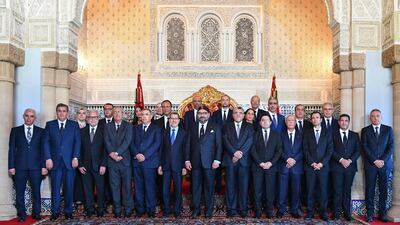Morocco drastically reduced the size of its cabinet in a reshuffle called for by King Mohammed VI to bring in "new blood" and officials "capable of raising performance levels".
The tourism, housing, youth and culture, employment, justice and health ministers were changed in the new line-up announced on Wednesday. The ministers of interior, finance, foreign affairs, religious affairs, agriculture, energy, trade and industry and education retained their posts.
The 39-member cabinet has been reduced to 24, including the prime minister, with finance and economy minister Mohamed Benchaaboun taking on the extra task of reforming the civil service, the state news agency MAP reported.
The number of women in government rose from one to four, including Nadia Fattah Alaoui, a financial executive who was appointed minister for tourism and civil aviation.
King Mohammed approved the list of new ministers submitted by Prime Minister Saad Dine El Otmani, MAP reported.
Mr El Otmani's moderate Islamist PJD party has seven cabinet posts in the newly configured government, while the liberal RNI led by business tycoon Aziz Akhannouch has four, including his own appointment as agriculture minister.
The socialist PPS party withdrew from the coalition last week over what it described as political disagreements.
Many of the new ministers are technocrats without clear party affiliation, a development that some analysts say shows the influence of the palace in appointing strategic portfolios.
"In the constitution, Morocco is a constitutional monarchy, but in reality it is close to an executive monarchy," Mohamed Masbah of the Independent Moroccan Institute for Policy Analysis told Reuters.
Morocco is seeking a new development model to fight poverty and curb regional and social disparities.
The country has largely been insulated from the turmoil that hit North Africa and the Middle East since the Arab uprisings of 2011, although it regularly sees protests over economic and social problems.

